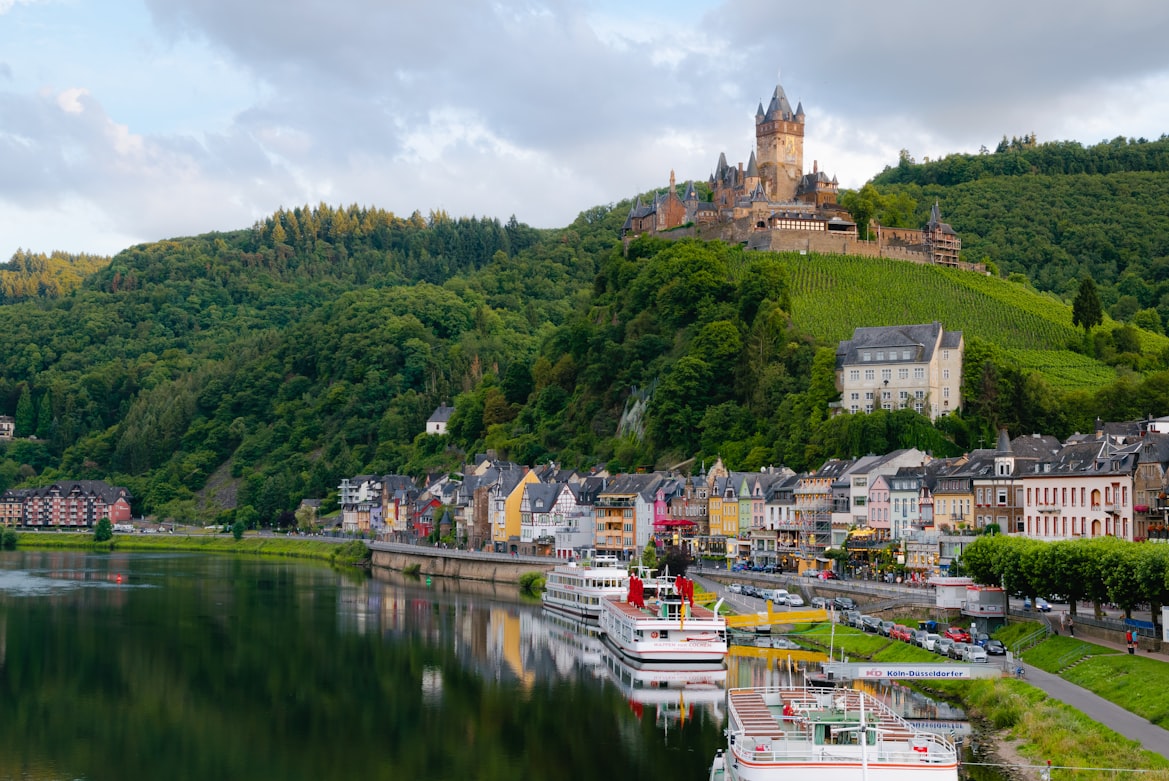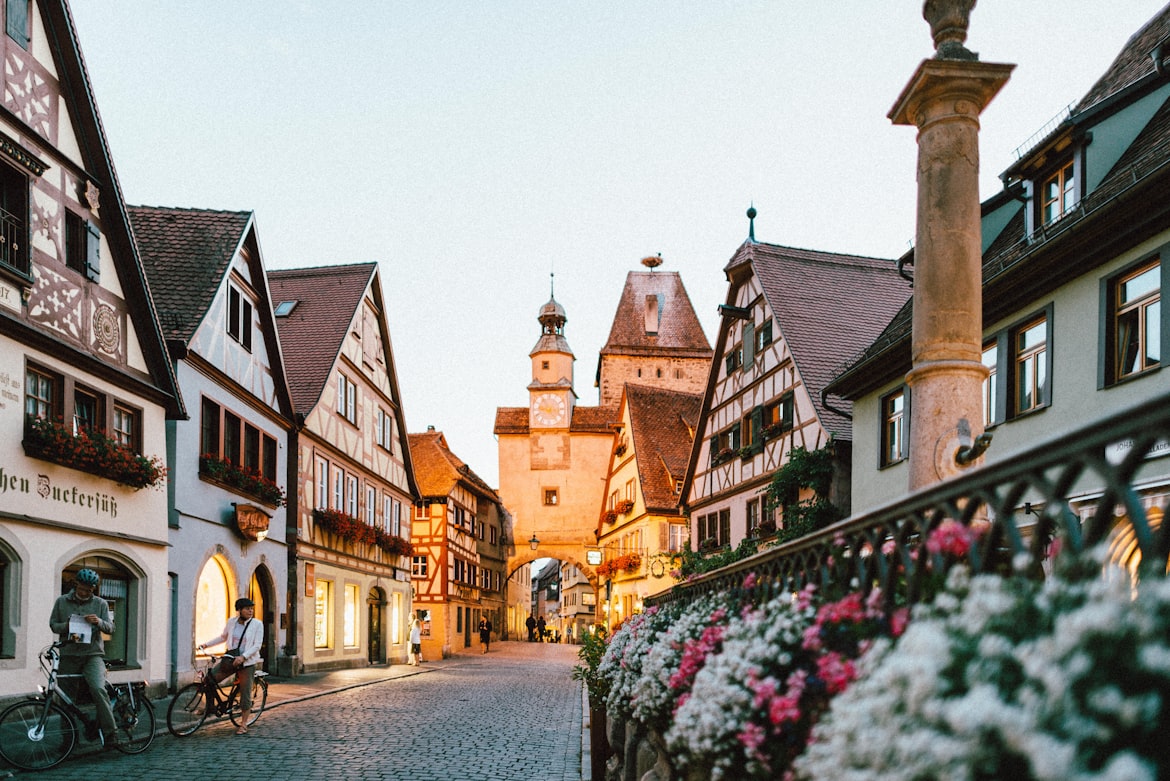Top Attractions
Germany boasts a diverse array of iconic landmarks, scenic landscapes, and cultural gems. In Berlin, the Brandenburg Gate and remnants of the Berlin Wall serve as powerful historical symbols, while Museum Island invites art and history lovers to explore world-class exhibitions. Bavaria offers the fairy-tale Neuschwanstein Castle nestled among the Alps, a must-see for architecture enthusiasts. The Black Forest is ideal for hikers and those seeking a tranquil escape into nature. Along the Rhine River, you’ll find picturesque towns like Bacharach and Rüdesheim, framed by hilltop castles and vineyards. Cologne’s magnificent Gothic cathedral dominates its skyline, while cities like Hamburg, Dresden, and Munich blend rich heritage with modern flair.
Local Dishes
Germany’s culinary landscape is hearty, regional, and surprisingly diverse. In Bavaria, traditional fare includes Weisswurst (white sausage) with sweet mustard, soft pretzels, and Schweinshaxe (pork knuckle). The Rhineland region offers Sauerbraten (pot roast) served with red cabbage and potato dumplings. Currywurst, a Berlin staple, is a beloved street food found in kiosks across the country. In the south, Käsespätzle—a cheesy egg noodle dish—is a comforting specialty. Regional breads, especially rye and multigrain varieties, are a highlight, as are sweet treats like Black Forest Cake and apple strudel. Don't forget to pair your meal with a locally brewed beer or a glass of Riesling wine from the Mosel Valley.
Transportation Tips
Germany’s transportation system is one of the most efficient in the world. The Deutsche Bahn (DB) railway network connects major cities and small towns with high-speed and regional trains. Travelers can benefit from the affordable “Deutschland Ticket,” offering unlimited travel on regional public transport. Urban transit systems in cities like Berlin, Munich, and Hamburg feature comprehensive U-Bahn (subway), S-Bahn (commuter rail), tram, and bus networks. Driving is easy on the autobahns—though be aware of speed limits in certain zones and urban areas. For short distances, bikes are a great option, with dedicated lanes and rental services widely available.
Budget Travel Tips
Germany can be surprisingly budget-friendly if you plan ahead. Opt for accommodations like hostels, guesthouses (Pensionen), or Airbnbs in non-central areas. Many cities offer free walking tours where you can tip what you feel is fair. Local bakeries are great for inexpensive breakfasts or lunches, and Imbiss (snack stands) serve delicious meals at low prices. Consider buying a multi-day transit pass or a group travel ticket to cut costs on transportation. Museums often have free or discounted admission days, and beer gardens allow you to bring your own food—so you can enjoy a picnic with a local brew affordably.
Safety Info
Germany is a very safe country for travelers. Crime rates are low, particularly in rural areas, and emergency services are responsive. Pickpocketing can occur in crowded urban areas or on public transport, so keep belongings close. Always validate transit tickets to avoid fines, and be cautious when crossing roads—cars have right-of-way in some situations. Tap water is safe to drink everywhere, and pharmacies are widely available for minor health concerns. Emergency numbers include 110 for police and 112 for fire or medical help.
Cultural Etiquette
Punctuality is highly valued in German culture—arriving late, even by a few minutes, can be seen as disrespectful. A firm handshake and maintaining eye contact are standard during introductions. When entering shops or restaurants, it's polite to greet with “Guten Tag” and say “Auf Wiedersehen” when leaving. Always address people formally using “Herr” or “Frau” followed by their last name unless invited otherwise. Germans appreciate quiet and order, particularly on Sundays or in shared accommodations, and it’s customary to recycle and follow local waste separation rules.
Travel Style Fit
Germany caters to nearly every travel style. Culture enthusiasts will find endless museums, galleries, and historic sites. Nature lovers can hike or bike through lush forests, mountains, and river valleys. Urban explorers can dive into trendy neighborhoods, nightlife, and modern design in cities like Berlin and Hamburg. Luxury seekers will appreciate five-star hotels, wellness spas, and gourmet dining, while budget travelers can enjoy affordable transportation, low-cost accommodation, and local food markets.

Best Time to Visit
Spring (April to June) and autumn (September to October) offer mild temperatures, fewer tourists, and beautiful scenery, making them the ideal times to visit Germany. Summer is vibrant with festivals like Berlin’s Christopher Street Day and Munich’s Tollwood Festival, but expect crowds and higher prices. Fall is especially appealing in Bavaria during Oktoberfest and when the countryside bursts into autumn colors. Winter travelers will enjoy Germany’s enchanting Christmas markets, particularly in Nuremberg, Cologne, and Dresden, along with snowy Alpine landscapes in the south.
Accommodation Recommendations
Budget travelers can enjoy clean, well-located hostels such as Generator Berlin or Meininger in various cities, offering dorm beds and social environments. For those looking for comfort without luxury prices, Hotel Motel One (available in multiple cities) offers stylish, affordable rooms in central locations. For a more upscale experience, The Charles Hotel in Munich or Hotel Adlon Kempinski in Berlin delivers luxury, impeccable service, and top-tier amenities.
Languages Spoken
German is the official language, and in most cities, many people—especially younger generations and those in the service industry—speak at least basic English. In more rural regions, English may be less common, so learning a few German phrases such as “Danke” (thank you), “Bitte” (please), and “Sprechen Sie Englisch?” (Do you speak English?) can go a long way in enhancing your experience.
Currency
Germany uses the Euro (€), and cash is still widely used, especially in smaller towns and local markets. While credit and debit cards are increasingly accepted in cities, it’s wise to carry cash for small purchases, restaurants, or public transport. ATMs (Geldautomaten) are easy to find, and withdrawing from bank-affiliated machines is usually safer and more cost-effective.
Common Traveler Mistakes to Avoid
Many travelers assume credit cards are accepted everywhere and end up caught off guard in restaurants or smaller shops that only take cash. Failing to validate train or tram tickets can lead to hefty fines, as plainclothes inspectors regularly patrol. Additionally, some tourists expect stores to be open on Sundays, but most businesses close except for some cafes and restaurants—so plan your shopping accordingly.
Essential Apps & Tools
DB Navigator is crucial for booking trains and checking schedules. Google Maps and Citymapper help with urban navigation. For translation and communication, DeepL or Google Translate are handy tools. Komoot is great for hikers and cyclists looking to explore off the beaten path. Too Good To Go is a smart app for grabbing discounted meals from local restaurants and bakeries, while NINA helps alert users about local emergencies or severe weather.
Suggested Itinerary Styles
A 10-day itinerary might begin in Berlin, exploring its museums, street art, and history. Then travel south to Dresden for its baroque architecture and on to Munich to enjoy beer gardens, day trips to Neuschwanstein Castle, and Bavarian traditions. Finish with a scenic train ride along the Rhine River visiting small towns like Heidelberg or Koblenz. Nature lovers could extend the trip with hiking in the Black Forest or skiing in the Bavarian Alps.
Fun Facts
Germany is home to over 25,000 castles, many of which are open to the public. The country also has more than 1,300 breweries, making it a paradise for beer lovers. Germany pioneered the invention of the printing press, invented by Johannes Gutenberg in the 15th century. Autobahns are famous for sections without speed limits, and the country recycles over 60% of its waste—one of the highest rates globally. It’s also the birthplace of the Christmas tree tradition and is known for its rich contributions to classical music and philosophy.
